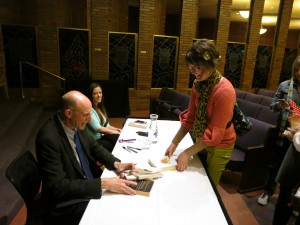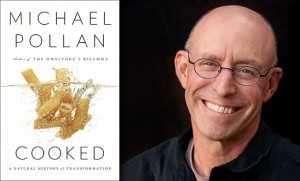
Author Michael Pollan speaking at Beth El Synagogue in Minneapolis.
Last night, I had the privilege of briefly meeting author Michael Pollan, one of the real food movement’s most articulate voices and one of my food heroes…or as he was introduced tonight, “the father of the modern food movement.”
Pollan just released his latest book, Cooked: A Natural History of Transformation, and is on book tour. I heard him speak at Beth El Synagogue in Minneapolis, along with over 1,500 other real food and health enthusiasts, including doctors, nurses, holistic health professionals and interested, hungry citizens.
Here are some highlights from his talk…that definitely inspired me, and perhaps will inspire you, too, to enjoy spending a bit more time in your own kitchen.
First, a natural history of being transformed by Michael Pollan

After speaking, Michael was gracious to sign all 4 books of his that I own.
I must admit that I’ve been a big fan of Michael Pollan since 2008, after seeing him in the films “Food Fight” and “Food Inc.” He delivers stories and soundbites in such a charming, practical way while spoonfeeding you grass-fed steak-like wisdom to chew on.
I savor his books In Defense of Food: An Eater’s Manifesto and Food Rules: An Eaters Manual.
And I’m now eager to dig in to Cooked, which explores how the 4 elements of fire, water, air and earth transform the stuff from nature into food we eat.
As a writer and holistic health educator, I uphold Michael Pollan as a modern day prophetic voice in the “food as medicine” movement. Reading is books will change how you view food and health for sure!
5 bites to chew on from Michael Pollan
1. Who is cooking your food?
The most important thing about your diet is who is cooking it—is it by humans or industrial corporations?” – Michael Pollan
Credit: Epicurious.com
It’s a fact that industrial corporations cook most of our food in the U.S., except as Pollan points out, it is “processed”—since we can’t really call what industrial agriculture does as “cooking.” As Michael said last night:
Corporations don’t cook very well. They buy the cheapest ingredients and add fat, salt and sugar to make it attractive and manipulate our tastes.”
A sad statistic he shared from the book is that the Average American spends less time cooking now than ever before in history—only 27 minutes per day to be exact. And “making a sandwich” counts as “cooking” in the definition that was used.
2. Are you victim of the “Cooking Paradox?
Millions of people now spend more time watching people cook food on TV than actually cooking their own food.”
Michael Pollan calls this the cooking paradox. You watch all this delicious real food being made on TV (probably while eating processed foods), rather than using that time to make a meal of your own.
Instead, get inspired to cook more at home with family or friends—and remember, you don’t need to cook a high-end restaurant-chef quality meal that you see on TV.
I know that when I make a simple, nutritious meal from scratch, I am always satisfied!
3. Don’t trust nutrition science.
Nutrition science as a field of study is where surgery was in the 1650s—promising, but you’re not going to get on the operating table yet.”
Just because nutrition scientists have come up with something new and shiny, doesn’t make it good for you. Most of what nutrition science comes up with anyway are the “edible food-like products” that we can technically swallow, but are actually not real food at all.
Michael also points out that people have been eating well long before they ever knew what an antioxidant was, for example. (Read In Defense of Food to learn how nutrition science took over real food by reducing it to specific “nutrients”—which actually plummeted public health.)
4. Microwavable meals are neither fast nor enjoyable.
I personally haven’t used a microwave for over 3 years now and I’ve never missed it! Really!
For this book, Michael Pollan did an experiment with his wife and son, where they all picked out their own microwavable meals for a family dinner and see if it is actually as convenient as people think.
You’ll have to read the delightful account of it in the book, but one of the results was finding out it took more time to heat and reheat the “airline quality food” than it would have to cook the similar (yet way more nutritious!) meal themselves from scratch.
5. Spend less time engaging in “Secondary Eating” and more time actually eating.
That’s what the FDA calls eating while doing something else, like watching TV, working, checking Facebook, etc…
Guilty as charged! This is definitely one I am going to shift in my own eating habits. Spend more time just eating. And preferably with family or friends.
Want to join me in cooking and eating more?
So what are you cooking this week? What are some of your favorite meals to cook? How do you view cooking now vs. how your mother or grandmother did it? Please share your comments and insights below!


Join the Conversation